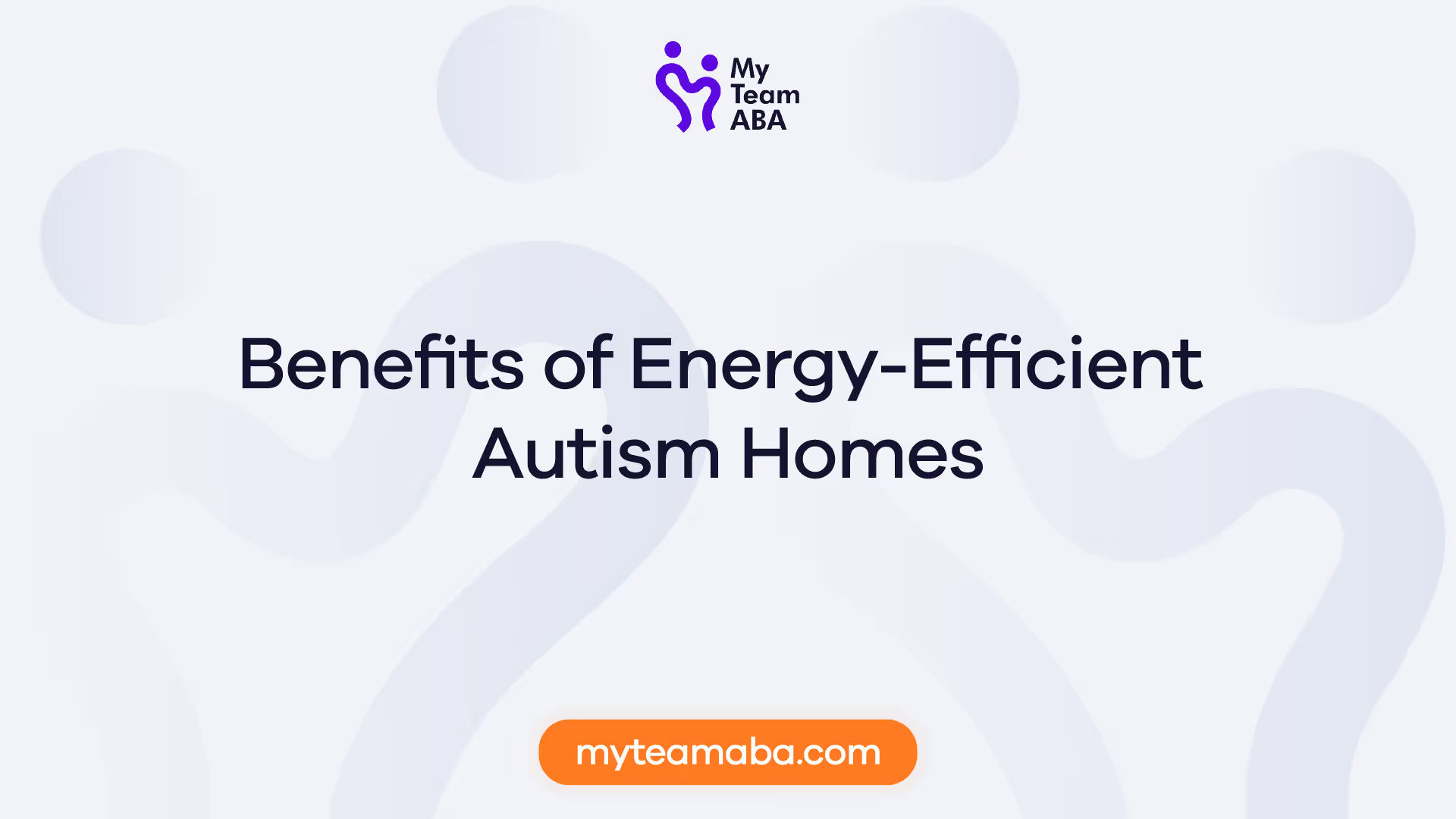Benefits of Energy-Efficient Autism Homes
March 3, 2025
Discover the benefits of energy-efficient autism homes. Save costs, prioritize energy conservation, and support your loved ones.

Importance of Energy-Efficient Homes
When considering the benefits of energy-efficient homes, it is essential to recognize the impact these homes can have on addressing housing affordability and improving the health and well-being of individuals. Particularly for families caring for individuals with autism, energy-efficient features can provide significant advantages.

Addressing Housing Affordability
Housing affordability remains a pressing concern in the United States, with a substantial portion of low-income households dedicating a significant portion of their income to housing costs. High housing costs can burden families, diverting crucial financial resources away from other essential needs, including healthcare and therapy expenses for individuals with autism.
Energy-efficient homes can help alleviate these financial strains by reducing monthly energy bills. Families with high energy burdens can benefit greatly from energy-efficient features, as they make energy more affordable and contribute to overall financial stability. By integrating eco-friendly energy solutions like solar panels and smart thermostats, families can reduce their energy consumption and lower their utility costs.
Impact on Health and Well-being
Financial constraints due to unaffordable housing can have adverse effects on health. Cost-burdened households are more likely to experience health issues such as hypertension, arthritis, and mental health challenges [1]. By implementing energy-efficient measures, families can alleviate some of the financial pressures associated with housing costs, potentially leading to improved overall well-being.
Energy-efficient homes not only contribute to lower energy bills but also provide a comfortable and healthier living environment. Features like clean energy systems can enhance indoor air quality and reduce environmental impact, creating a more sustainable and supportive setting for individuals with autism.
Moreover, the initial higher purchase price of energy-efficient products, such as electric heat pump water heaters, is offset by long-term savings on energy bills. With advancements in technology and building practices, ENERGY STAR certified homes are now at least 10% more energy-efficient than standard homes, achieving a 20% improvement on average. This improved energy performance not only benefits the environment but also enhances the quality, performance, and comfort of homes, ultimately promoting the health and well-being of residents.
By recognizing the advantages of energy-efficient homes in addressing housing affordability and supporting health and well-being, families caring for individuals with autism can create a more sustainable and conducive living environment for their loved ones.
Financial Challenges for Autism Families
Families raising a child with autism face unique financial challenges, stemming from the substantial costs associated with providing the necessary care and support. Understanding the financial implications of raising a child with autism is crucial for families to navigate the complexities of managing their finances effectively.
Cost of Raising a Child with Autism
A study conducted in 2020 found that the average per capita cost of Autism Spectrum Disorder (ASD) is $3,566,881, significantly higher than raising a child without ASD in the United States Research in Autism Spectrum Disorders. This considerable financial burden includes expenses related to medical care, therapy, education, and specialized services tailored to meet the unique needs of individuals with autism.
Healthcare and Therapy Expenses
Medical costs for children with autism vary, with healthcare costs for autistic individuals in the USA increasing with age. The costs escalate from $6,467 (0-5 years) to $13,580 (18+ years), with significantly higher costs for individuals with co-occurring diagnoses Pediatr Res. Therapy costs for children with autism, including speech, occupational, physical therapy, and Applied Behavior Analysis (ABA), can be substantial, ranging from $46,000 to $47,500 annually for ABA therapy Special Learning, Inc.
It's important to note that individuals with autism may acquire additional diagnoses such as anxiety, depression, ADHD, leading to more doctors' appointments, medications, and associated costs that are often not initially considered Hope For Three. This emphasizes the significant financial strain that families of children with autism endure.
To provide financial support, the ABLE Act of 2014 established private tax-advantaged savings accounts called ABLE accounts. These accounts enable families of individuals with disabilities to save for long-term expenses without affecting eligibility for public benefits like Medicaid and Supplemental Security Income (SSI) Autism Speaks. Understanding and managing these financial challenges is essential for autism families to ensure the well-being and quality of life of their loved ones.
Energy Efficiency and Financial Benefits
When considering the benefits of energy-efficient homes for individuals with autism, it's essential to highlight the financial advantages associated with decreased energy burdens and savings from energy-efficient products.
Decreasing Energy Burdens
Energy efficiency plays a crucial role in lowering monthly energy bills, which can be particularly beneficial for families facing financial challenges associated with raising a child with autism. According to ENERGY STAR, by reducing energy consumption, energy-efficient practices can significantly decrease the strain of paying for energy, especially for families with high energy burdens. This reduction in energy costs can enhance financial stability and overall well-being for families caring for loved ones with autism.
Savings from Energy-Efficient Products
While some energy-efficient products may have a higher initial purchase price compared to traditional options, the long-term savings they offer outweigh the upfront investment. For instance, devices like electric heat pump water heaters may have a higher upfront cost but deliver substantial savings through reduced energy consumption over time. These ongoing bill savings not only decrease energy costs for consumers but also contribute to making energy more affordable in the long run.
Moreover, utilities often provide rebates and discounts to address the initial cost barrier associated with energy-efficient products. These incentives can further encourage the adoption of energy-efficient technologies, making them more accessible to families seeking to optimize their energy consumption and reduce financial strain.
By embracing energy efficiency in autism homes, families can not only enjoy reduced energy burdens and savings but also contribute to a sustainable and eco-friendly environment. To explore more eco-friendly energy options for autism centers, check out our article on eco-friendly energy for autism centers.
Energy Efficiency Programs and Support
Providing energy-efficient autism homes not only benefits the environment but also offers financial relief and support for families raising children with autism. Understanding the available programs and support systems is essential for maximizing the advantages of energy efficiency in these households.
Medicaid Waivers and Financial Assistance
Medicaid Waivers play a crucial role in supporting families of individuals with developmental disabilities, including autism. Programs like the 1915(c) Home and Community Based Services provide a range of support services to help these individuals remain at home or in the community instead of in institutions. These waiver programs commonly cover medical treatments, respite care, transportation, in-home support, and more [3].
Additionally, families can explore financial assistance programs provided by Community Action Agencies. These agencies offer various support programs for low-income residents, which can include rental assistance, energy assistance, food programs, education, emergency assistance, and more. Such programs aim to alleviate financial burdens and ensure that families have the necessary resources to create a conducive environment for their loved ones with autism.
Special Needs Financial Planning
Creating a comprehensive financial plan is essential for families raising children with special needs, including autism. The Special Needs Financial Planning Tool Kit offered by Autism Speaks is a valuable resource. This kit provides families with the information and tools needed to develop a financial plan for the future of their child with special needs. It includes insights from experts in the field and personal stories from other parents or caregivers, offering practical guidance and support [3].
Moreover, the ABLE Act of 2014 has authorized the establishment of ABLE accounts, which are tax-advantaged savings accounts designed to help families save for long-term expenses without affecting eligibility for public benefits like Medicaid and Supplemental Security Income (SSI). These accounts provide families with a means to secure financial stability while ensuring continued access to essential support services.
By leveraging the resources and assistance provided through Medicaid waivers, financial planning tools, and government-backed energy schemes, families can navigate the financial challenges associated with raising a child with autism while building energy-efficient homes that promote sustainability and well-being. It is through these programs and support systems that families can create a nurturing environment that meets the unique needs of individuals with autism while fostering energy conservation and financial security.
Practical Energy Solutions for Autism Homes
To ensure that energy-efficient autism homes are not only sustainable but also cost-effective, prioritizing energy conservation and utilizing government energy schemes are essential strategies.
Prioritizing Energy Conservation
One of the key benefits of energy-efficient homes is the significant reduction in energy consumption, leading to lower monthly energy bills. By lowering energy use, families can make energy more affordable, especially for those with high energy burdens. Energy efficiency not only reduces the strain of paying for energy but also contributes to financial stability and overall well-being. Investing in energy-efficient products may have a higher initial cost, but the long-term savings they bring can make a notable difference in managing household expenses.
Utilizing Government Energy Schemes
For families facing financial challenges, seeking assistance from government-backed energy schemes can provide valuable support in improving the energy efficiency of their homes. Programs like ECO4, Great British Insulation, and Boiler Upgrade schemes offer upgrades such as solar panels, heat pumps, and home insulation at no cost for qualifying households. Individuals claiming specific means-tested benefits are likely to qualify for these initiatives, which aim to enhance the energy efficiency of properties and reduce overall energy costs.
Moreover, additional financial assistance in the form of the Cost of Living Payment and the Disability Cost of Living Payment, introduced by the UK Government in 2023, can further alleviate the financial burden of rising fuel and food costs for eligible individuals. These grants are disbursed in installments over the span of 2023 and 2024, providing crucial support to families in need.
By combining efforts to prioritize energy conservation within homes and taking advantage of government energy schemes, families with autism can not only achieve greater energy efficiency but also enhance their financial stability and well-being. These practical solutions pave the way for creating sustainable living environments that cater to the unique needs of individuals with autism.
Energy Conservation Strategies for Autism
In the realm of energy-efficient homes specifically tailored for individuals with autism, implementing effective energy conservation strategies is crucial for promoting a supportive living environment. Two fundamental aspects of energy management in autism homes are the "Spoon Theory" and the recognition of depleting factors that impact energy levels.
Spoon Theory and Energy Management
The "Spoon Theory" serves as a valuable concept in aiding individuals with autism in effectively managing their daily energy levels. By utilizing the Spoon Theory, individuals can communicate their energy reserves and ensure they allocate their limited energy appropriately throughout the day. This theory provides a common language that aids in conserving energy, navigating daily tasks, and avoiding unnecessary burnout.
In the context of energy-efficient autism homes, understanding and integrating the principles of the Spoon Theory can significantly improve energy management for individuals with autism. By recognizing and respecting their energy boundaries, caregivers and family members can create a supportive environment that promotes overall well-being and reduces unnecessary stress.
Recognizing Depleting Factors
Equally important in the realm of energy conservation for autism homes is the recognition and management of various depleting factors that can significantly impact energy levels. Factors such as meltdowns, lack of sleep, sensory overload, and social interactions can drain energy reserves rapidly and impede daily functioning [4].
Incorporating strategies to minimize these depleting factors within the home environment is essential for promoting energy efficiency and ensuring the well-being of individuals with autism. By creating a sensory-friendly space, fostering routines that support quality sleep, and implementing strategies to manage sensory input and social interactions, it becomes possible to reduce energy drain and enhance overall comfort and functioning.
By embracing the concepts of the Spoon Theory and proactively addressing depleting factors, energy conservation strategies tailored for autism homes can create a supportive and sustainable living environment that prioritizes the unique energy challenges faced by individuals with autism. For more information on eco-friendly energy solutions and smart technologies for autism care, explore our articles on eco-friendly energy for autism centers and smart thermostats for autism comfort.
Setting Boundaries for Energy Management
When it comes to energy management in the context of autism homes, setting appropriate boundaries is essential. This section emphasizes the significance of self-care and delves into the unique energy challenges faced by individuals with autism.
Importance of Self-Care
Self-care plays a pivotal role in the overall well-being of individuals with autism, helping them manage their energy effectively, reduce stress, and promote mental and emotional health. Implementing self-care strategies into daily routines can make a significant difference in how individuals with autism navigate daily challenges and conserve their energy levels [4]. Prioritizing self-care activities such as adequate rest, proper nutrition, and engaging in activities that bring joy and relaxation can contribute to a better energy balance and overall quality of life.
Unique Energy Challenges in Autism
Individuals with autism often face unique energy challenges that require special attention and consideration. Factors such as sensory overload, meltdowns, lack of sleep, and navigating social interactions can significantly impact energy levels and daily functioning. Recognizing and managing these depleting factors is crucial in assisting individuals with autism in conserving their limited energy and effectively managing their daily routines. By understanding these challenges and developing personalized strategies to address them, individuals with autism can better manage their energy resources and engage more effectively in daily activities.
In the context of energy-efficient autism homes, recognizing the importance of self-care and understanding the unique energy challenges faced by individuals with autism is fundamental to creating a supportive and nurturing environment. By incorporating self-care practices and tailored strategies for managing energy levels, families and caregivers can promote the well-being and energy conservation of individuals with autism within their homes.
For additional insights on eco-friendly energy solutions tailored for autism centers, the benefits of solar panels in autism care settings, the comfort provided by smart thermostats in sensory-friendly homes, and the advantages of clean energy in promoting a sustainable and supportive environment, explore our related articles.
Supporting Children with Autism
Understanding the unique challenges faced by children with autism in managing their energy levels is crucial for providing them with the necessary support and creating an environment that caters to their specific needs.
Understanding Energy Challenges
Many autistic children exhibit indifference to temperature, leading to difficulties in regulating body temperature. This can result in increased heating bills for parents and caregivers as they strive to maintain a stable household temperature that is comfortable for their children with autism. By recognizing these energy challenges, adjustments can be made to ensure that the living environment is conducive to the well-being of autistic individuals.
It's important to acknowledge that the energy challenges faced by children with autism can impact their daily routines and overall quality of life. Tailoring living spaces to accommodate these challenges can help create a more comfortable and supportive environment for individuals on the autism spectrum.
Impact of Environment on Energy Levels
The environment plays a significant role in influencing the energy levels and well-being of children with autism. Factors such as lighting, noise levels, and temperature can have a profound impact on their sensory experiences and overall comfort. Creating a sensory-friendly environment that takes into consideration these factors can help regulate energy levels and reduce anxiety and stress among individuals with autism.
Implementing energy-efficient measures, such as utilizing eco-friendly energy sources like solar panels, and incorporating smart technologies like smart thermostats can not only improve energy efficiency in autism homes but also contribute to creating a sensory-friendly living space. These enhancements can promote a more tranquil and comfortable environment that supports the specific needs of children with autism.
By understanding the energy challenges faced by children with autism and recognizing the impact of the environment on their energy levels, caregivers and individuals can work together to create a supportive and nurturing living environment that prioritizes the well-being and comfort of individuals on the autism spectrum. Making conscious efforts to tailor the surroundings to meet the unique needs of individuals with autism can significantly enhance their quality of life and contribute to their overall development and happiness in their homes.
References
[2]:
[3]:
[4]:
[5]:
[6]:
